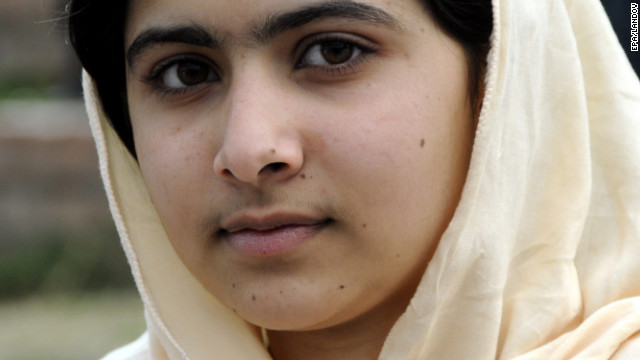
Islamabad, Pakistan (CNN) -- The Pakistani Taliban
sought to silence the teenage education activist Malala Yousufzai by shooting
her in the head. They're also trying to stifle the widespread criticism of the
attack in the news media by threatening journalists in Pakistan.
The
militant group's menacing statements have intensified fears among reporters in
a country that is already one of the most dangerous places in the world to be a
journalist.
The
attack on Malala, 14, in the northwestern district of Swat last week has left
her battling to recover from her injuries in a hospital in Britain and
generated a wave of shock and anger in Pakistan and around the world.
The Taliban quickly claimed responsibility
for the act, but they didn't appear to have anticipated the level of revulsion
and condemnation that it would provoke. Thousands of people joined in rallies
across Pakistan in support of the wounded teen, and calls grew for a strong
response from the government.
As coverage of the shooting -- and the
appalled reaction to it -- swept across the Pakistani and international news
media, the Taliban began issuing lengthy statements trying to justify the
targeting of Malala, who had defied them by insisting on the right of girls to
go to school.
They also complained that "this filthy,
godless media has taken huge advantage of this situation, and journalists have
started passing judgment on us," raising the prospect of killing those
journalists.
Reporters in northwestern Pakistan, the
region where the Taliban are active, say they have been alerted by authorities
of an increased risk to their security and some of them have received warnings
that they are being specifically targeted.
"Things after Malala have become more
tense, as the Taliban is very angry with the way the attack was reported,"
said a veteran journalist in Peshawar, the main city in the restive
northwestern region near the border with Afghanistan. "We are scared, but
what can we do? We have to work."
The journalist, who spoke on the condition
of anonymity because of fear of reprisals, noted that factions of the Taliban
had killed and abducted other journalists in the past because they were unhappy
with their coverage.
Tanvir Ahmed Tahir, the executive director
of the All Pakistan Newspapers Society, a trade body of publishers, said the
organization had requested extra security from the government to protect its
members' operations and staff in light of the Taliban statements.
The militants' threats against journalists
for covering an attack for which they had unabashedly claimed responsibility
may seem contradictory. But it goes to the heart of the Taliban's approach,
according to Mustafa Qadri, Pakistan researcher for the human rights group
Amnesty International.
"The underlying thing to understand
is the Taliban only have one modus operandi: violence," said Qadri, who is
based in Britain but travels to Pakistan regularly. "They use it to
intimidate people and coerce them into doing what they want."
He said that some of the local journalists
he had spoken to in northwestern Pakistan -- including in Mingora, the main
town in the Swat Valley where Malala's family lives -- were "very
shaken" by the Taliban threats and had asked him to pray for them.
"These people have families and
children," he said. "Part of their job is going out into the field --
they don't have luxury of leaving the country" like foreign journalists.
Despite the risks, the Malala story is
still "actively being taken up by the press" and journalists are
"doing their duty," Tahir of the newspaper society said.
That role is all the more significant in a
part of the world caught amid various geopolitical riptides.
The volatile area southwest of Peshawar,
along the porous border between Pakistan and Afghanistan, is a base for
extremist groups, the focus of the controversial U.S. drone strike program and
the scene of clashes between Pakistani security forces and militants.
Much of it has become a no-go area for
reporters, especially those from Western news organizations, but some local
journalists still venture into risky areas.
"If we don't have these people doing
this job, we won't know what's happening," said Qadri. "When
conflicts are fought away from the media lens, that increases the scope for
abuses."
The dangers that journalists already face
in Pakistan are well documented.
More journalists were killed there than in
any other country in both 2010 and 2011, according to the Committee to Protect
Journalists (CPJ), a group based in New York that promotes press freedom around
the world.
"Many of those who died in targeted
killings had first been warned to be silent," the group said in a blog post on its website.
Threats can come not just from militants,
but also from government agencies, the CPJ said.
"It's really tough being a journalist
in Pakistan, especially on the front line where they are under constant
pressure from the Taliban, the state and even political parties," said
Qadri, who worked as a reporter in the country for four years. "It's a very
politicized environment."
SOURCHE: http://edition.cnn.com/2012/10/19/world/asia/pakistan-taliban-media-threat/index.html?hpt=hp_c4
Δεν υπάρχουν σχόλια:
Δημοσίευση σχολίου